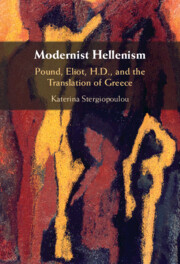Book contents
- Modernist Hellenism
- Modernist Hellenism
- Copyright page
- Dedication
- Contents
- Acknowledgments
- Abbreviations
- Introduction
- Part I Hellenists and Modernists
- Chapter 1 “The some more vital equation”
- Chapter 2 “The glory that was this and the grandeur that was the other”
- Part II “I don’t want to write it”
- Part III Tragedy and Translation in Late Modernism
- Part IV The Long Imagist Poem
- Bibliography
- Index
Chapter 2 - “The glory that was this and the grandeur that was the other”
Pound, Eliot, and Greek Drama
from Part I - Hellenists and Modernists
Published online by Cambridge University Press: 21 November 2024
- Modernist Hellenism
- Modernist Hellenism
- Copyright page
- Dedication
- Contents
- Acknowledgments
- Abbreviations
- Introduction
- Part I Hellenists and Modernists
- Chapter 1 “The some more vital equation”
- Chapter 2 “The glory that was this and the grandeur that was the other”
- Part II “I don’t want to write it”
- Part III Tragedy and Translation in Late Modernism
- Part IV The Long Imagist Poem
- Bibliography
- Index
Summary
This chapter treats Pound’s collaboration with Eliot from 1917 into the late 1930s from the perspective of their engagement with Greek. It focuses on the interconnection between drama (whether Japanese Noh or Greek tragedy) and the ambition of the long poem; consistent with their turn to formal verse in 1917, the two poets view theater through a similarly formalist lens. The author traces Pound and Eliot’s joint obsession with Aeschylus’s Agamemnon through an examination of their essays – especially Pound’s multi-part “Hellenist Series” (1918–19) and his writings on Jean Cocteau – private correspondence, and select poetic work and translations (e.g., Pound’s unpublished “Opening for Agamemnon,” Eliot’s “Sweeney among the Nightingales”). Whereas Eliot “declines the gambit, shows fatigue” and chooses to treat Aeschylus from a distance, Pound is both more ambivalent about Aeschylus’s value and more in thrall to elements of his poetic technique and language. Though Pound and Eliot’s abortive Greek projects would lie dormant for some years, the chapter examines the attempted rekindling of their Greek collaboration in the mid-1930s, which provides the transition between the early texts discussed in this chapter and their mature work.
Keywords
- Type
- Chapter
- Information
- Modernist HellenismPound, Eliot, H.D., and the Translation of Greece, pp. 81 - 132Publisher: Cambridge University PressPrint publication year: 2024

